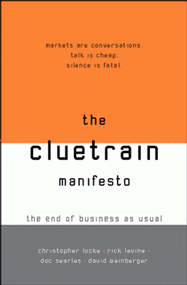 I picked out some of my favorite theses from The Cluetrain Manifesto.
I picked out some of my favorite theses from The Cluetrain Manifesto.
See below:
- Hyperlinks subvert hierarchy.
- As a result, markets are getting smarter, more informed, more organized. Participation in a networked market changes people fundamentally.
- People in networked markets have figured out that they get far better information and support from one another than from vendors. So much for corporate rhetoric about adding value to commoditized products.
- There are no secrets. The networked market knows more than companies do about their own products. And whether the news is good or bad, they tell everyone.
- Companies that assume online markets are the same markets that used to watch their ads on television are kidding themselves.
- Companies that don't realize their markets are now networked person-to-person, getting smarter as a result and deeply joined in conversation are missing their best opportunity.
- Companies can now communicate with their markets directly. If they blow it, it could be their last chance.
- Companies need to lighten up and take themselves less seriously. They need to get a sense of humor.
- Getting a sense of humor does not mean putting some jokes on the corporate web site. Rather, it requires big values, a little humility, straight talk, and a genuine point of view.
- Companies need to come down from their Ivory Towers and talk to the people with whom they hope to create relationships.
- Intranets naturally tend to route around boredom. The best are built bottom-up by engaged individuals cooperating to construct something far more valuable: an intranetworked corporate conversation.
- While this scares companies witless, they also depend heavily on open intranets to generate and share critical knowledge. They need to resist the urge to "improve" or control these networked conversations.
- When corporate intranets are not constrained by fear and legalistic rules, the type of conversation they encourage sounds remarkably like the conversation of the networked marketplace.
- Today, the org chart is hyperlinked, not hierarchical. Respect for hands-on knowledge wins over respect for abstract authority.
- Smart companies will get out of the way and help the inevitable to happen sooner.
If you want us to talk to you, tell us something. Make it something interesting for a change. - We want you to take 50 million of us as seriously as you take one reporter from The Wall Street Journal.
- We know some people from your company. They're pretty cool online. Do you have any more like that you're hiding? Can they come out and play?
- When we have questions we turn to each other for answers. If you didn't have such a tight rein on "your people" maybe they'd be among the people we'd turn to.
No comments:
Post a Comment